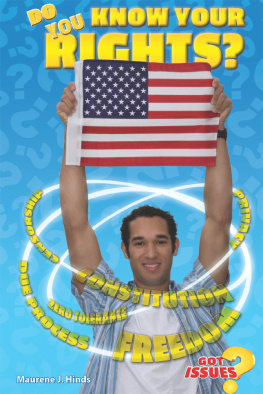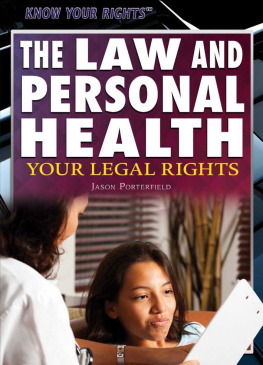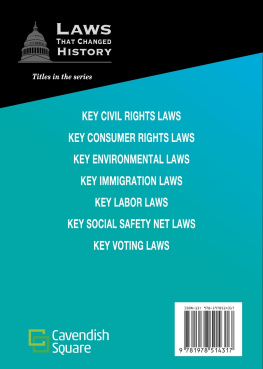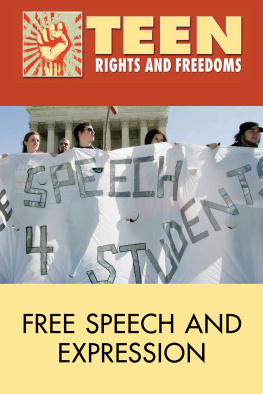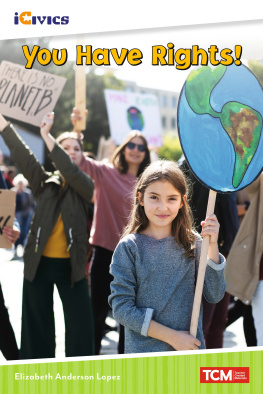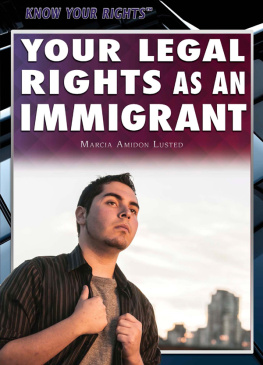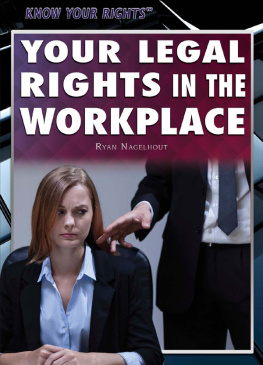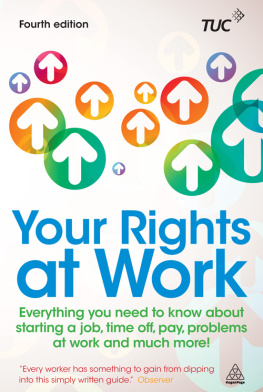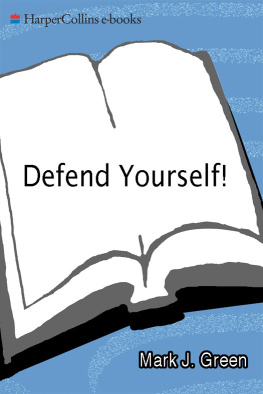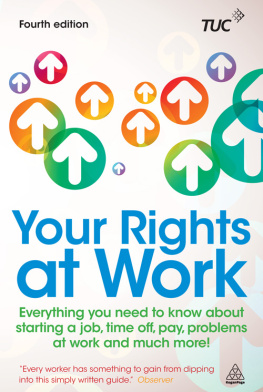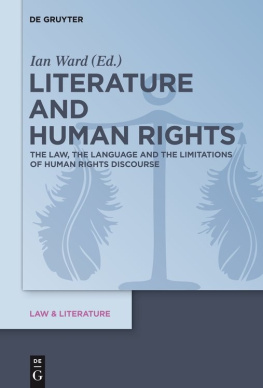Published in 2016 by Enslow Publishing, LLC
101 W. 23rd Street, Suite 240, New York, NY 10011
Copyright 2016 by Maurene J. Hinds
All rights reserved.
No part of this book may be reproduced by any means without the written permission of the publisher.
Library of Congress Cataloging-in-Publication Data
Hinds, Maurene J.
Do you know your rights? / Maurene J. Hinds.
pages cm. (Got issues?)
Audience: Grade 9 to 12.
Includes bibliographical references and index.
ISBN 978-0-7660-7193-3
1. Parent and teenagerJuvenile literature. 2. Childrens rightsJuvenile literature. 3. TeenagersLegal status, laws, etc.Juvenile literature. I. Title.
HQ799.15.H56 2016
305.235dc23
2015028088
Printed in the United States of America
To Our Readers: We have done our best to make sure all website addresses in this book were active and appropriate when we went to press. However, the author and the publisher have no control over and assume no liability for the material available on those websites or on any websites they may link to. Any comments or suggestions can be sent by e-mail to
Portions of this book originally appeared in the book You Have the Right to Know Your Rights: What Teens Should Know.
Disclaimer: For many of the images in this book, the people photographed are models. The depictions do not imply actual situations or events.
Photo Credits: Cover, p. 1 Jason Stitt/Shutterstock.com; pp. 4, 48, 51, 68, 78 Monkey Business Images/ Shutterstock.com; p. 7 Library of Congress Prints and Photographs Division; p. 8 Franklin D. Roosevelt Library, U.S. National Archives and Records Administration; p. 11 Diego Cervo/Shutterstock.com; p. 14 Ken Durden/Shutterstock.com; p. 17 Annemarie Mannion/Chicago Tribune/MCT via Getty Images; p. 19 Brian Branch Price/Bloomberg via Getty Images; p. 23 RJ Sangosti/The Denver Post via Getty Images; p. 29 Photodisc/Thinkstock; p. 31 Paul/Thinkstock; pp. 33, 81 monkeybusinessimages/iStock//Thinkstock; p. 34 rmnoa357/Shutterstock.com; p. 37 Blend Images/Shutterstock.com; p. 38 Comstock/ Stockbyte/Thinkstock; p. 42 Wavebreakmedia/Shutterstock.com; p. 44 4774344sean/iStock/Thinkstock; pp. 55, 91 AP Images; p. 57 imging/Shutterstock.com; p.61 Jupiterimages/Stockbyte/Thinkstock; pp. 65, 90 bikeriderlondon/Shutterstock.com; p. 71 Jasminko Ibrakovic/Shutterstock.com; p. 73 Gary Blakeley/Shutterstock.com; p. 83 KatarzynaBialasiewicz/iStock/Thinkstock; p. 86 asife/Shutterstock.com; p. 88 joloei/Shutterstock.com; p. 93 AP Photo/The Record (Bergen County), Marko Georgiev; p. 95 Scott Olson/Getty Images News/Getty Images.
What Are Your Rights?
I n September 2009, a student, G.C., was caught texting during school, a violation of the Kentucky schools policies on cell phone use. The teacher took his phone and gave it to the assistant principal, who then read through other text messages on the phone. The student had been involved in prior disciplinary issues, and the assistant principal claimed that she read through the other messages to ensure G.C. wasnt planning to hurt himself or someone else. The student was expelled.
G.C. and his parents sued the school and argued that the search was a violation of G.C.s Fourth Amendment rights. The Fourth Amendment protects The right of the people to be secure in their persons, houses, papers, and effects, against unreasonable searches and seizures, shall not be violated, and no Warrants shall issue, but upon probable cause, supported by Oath or affirmation, and or things to be seized.1 In this case, the family argued that when the assistant principal read through other messages, it was an unreasonable search and seizure of G.C.s private information, even though the event took place during school.
The case made it to the United States Court of Appeals, where it was determined that G.C.s rights were, in fact, violated, both for the expulsion and the search of his phone. In the explanation of the case, the court stated, in part, that,... using a cell phone on school grounds does not automatically trigger an essentially unlimited right enabling a school official to search any content stored on the phone that is not related either substantively or temporally to the infraction.2 In other words, the school took the issue too far by searching personal information on the phone after confiscating it from the student.
This case helped pave the way for both students and schools regarding rights related to emerging technology. Schools have a responsibility to keep students safe while respecting the rights of minors.
Minors are people under the age of eighteen. In most states, eighteen is the age at which minors become adults with most legal rights. These include the right to vote and to serve in the armed forces. Other rights also become legal at this age, such as the right to enter into a contract.
Certain basic rights are sometimes called human rights. These have less to do with the law. These are what some people think are rights basic to all humanity. An example is the right to live in a dignified manner. For example, many people do not consider slavery to fit the definition of dignified. As a result, many people think slavery is a serious violation of human rights.
This resource discusses issues about both legal rights and human rights. It also covers a number of questions related to rights. Do minors have rights? Should they have rights? If so, which ones? Who controls those rights? Is it lawful and ethical (good or right in conduct) to restrict rights of persons under eighteen?
Until fairly recently, children had few rights even in the United States. The law considered children property of their parents. This meant that parents could treat their children however they saw fit. This could include physical harm. Parents could hit their children or even sell them into slavery. Over time, however, parents and others began to see children as people. They saw that children had rights and were not property. Still, even today, many children around the world do not have the same rights as children in the United States.
Throughout history, issues of human rights have evolved. This can be seen in examples of uprisings against oppressors, revolutions, and wars. The United States history grew out of the oppression the founders tried to escape. The Revolutionary War released the colonists from British rule. Later, the enslavement of African Americans became an issue of human rights and led to the Civil War. Over time, the Industrial Revolution gave rise to many changes in the way Americans did business. Dangerous work and long working hours led workers to revolt and demand changes. The world discovered Hitlers horrors during World War II. After this, human rights became even more of an issue around the world.
In 1948, the United Nations developed the Universal Declaration of Human Rights (UDHR). This document listed what the organization considered to be basic human rights. These included the right to life, security, freedom of expression, and education. The articles of the declaration are not law. They do serve as a guide for all nations on human rights issues. But not all nations agree that these are basic human rights. Even people in the United States do not all agree on what human rights are or should be. Those nations that agree with the declarations set forth by the United Nations pledge their support by first signing the articles. After signing, they ratify them, meaning those nations formally and legally agree to the articles.

